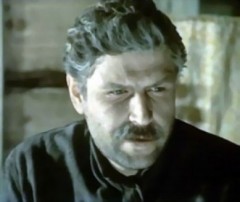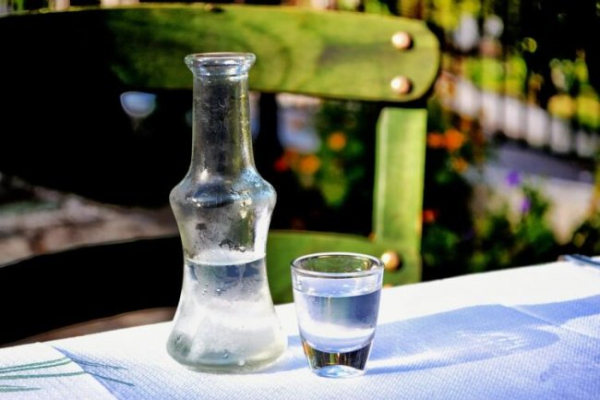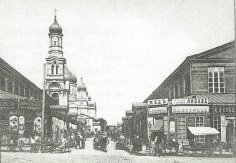
On December 10, 1989, the renowned Soviet actor Vadim Spiridonov took a couple of hours' nap before a late-night shoot. When the allotted time had passed, his wife decided to wake him. They were unable to do so: Vadim Semyonovich died in his sleep from heart failure. A month and a half earlier, Spiridonov had celebrated his 45th birthday.
His biography is somewhat typical. Born on October 14, 1944, in Moscow, he attended a school for working youth and participated in a drama club. He made his film debut relatively late, at age 25. But over the course of his twenty-year film career, he played so many roles that some would struggle to achieve in half a century. Unfortunately, or perhaps fortunately, he most often landed roles with villains. And he “sculpted” them so skillfully that his characters were always perceived as villains of universal proportions.
Let's just recall Fyodor Savelyev in one of the first Soviet “long-running” films, “Eternal Call.” How many Soviet people literally started shaking after each episode. I vividly remember how my grandfather's brother, a tank driver who had served in the front lines, jumped up from the couch after one of “Fedka's” mean tricks and screamed, “I'll strangle that bastard with my bare hands!”
Later, I read Anatoly Ivanov's book “Eternal Call.” “Fedka” wasn't such a flamboyant villain there. Much of it, as I now understand, was brought to this character by Spiridonov himself. And he did it so convincingly that the entire country hated him. But you have to admit, that's something you have to be good at!
Or another episode: an equally memorable film with a sequel, “Earthly Love” and “Fate.” Filmed just as work on the multi-part series “Eternal Call” was in full swing, Yevgeny Matveyev pondered long and hard over who to cast in one of the key roles—the traitor and policeman Fyodor Makashin. He chose Spiridonov. And he was right. But that didn't make things any easier for the actor himself. Vadim Semyonovich sometimes recalled how, after the release of “Fate,” a generation of front-line soldiers fiercely hated him. More than once, he heard the contemptuous “Judas!” shouted behind him on the streets of Moscow, and sometimes people even tried to beat him up.
Perhaps it was precisely because of these two “treacherous” roles that some people who tried to write about Spiridonov mistakenly assumed he was such an actor in real life. And his anger and prickliness stemmed from his adolescence in the criminal and lowlife milieu, where among the city's thugs, all conflicts were resolved by one thing: fighting. And the Sokolniki district, quite remote from Red Square, which would now be called a “bedroom” district, could have instilled in the teenager precisely this mentality: “Strength breaks straw.”
Not long ago, Vadim Semenovich's widow debunked such myths. The future actor's parents were intelligent people who instilled in their son a keen sense of justice, and their neighborhood (Vadim and Valentina met at a fairly young age) wasn't all that grim. After all, standing up for yourself never hurt anyone.
Was Spiridonov a quarrelsome person? A fierce debater? A man who knew no compromise? Probably no more than others. But he always had principles: if he believed himself to be 100% right, he wouldn't give in to anyone. Not even the director! How many directors liked stubborn actors? I doubt it…
Incidentally, Valentina Sergeevna dispelled another myth: that Spiridonov, having “stepped into a traffic jam,” could remain in a drunken stupor for a week or two, effectively becoming a binge drinker. In fact, several times the actor simply faked “drunkenness.” This happened when directors pestered him with scripts that Vadim couldn't accept due to their naivety and weakness. And no amount of “I won't act!” would get through to them.
Can such actions be perceived as the whims of a genius? If Vadim Semyonovich himself were asked a similar question, he would likely dismiss it with a “take it as you wish!” But the history of Russian cinema doesn't know many cases where a recent drama club participant at a factory community center decided to apply to three of Moscow's major creative universities—the Shchukin School, the Moscow Art Theater School, and VGIK—and scored passing grades at all of them. Spiridonov succeeded! He chose VGIK and became a student in the workshop of Sergei Gerasimov and Tamara Makarova. After graduating, he became an actor at the Film Actor's Studio Theater, a feat not everyone could achieve.
Incidentally, one of Spiridonov's first roles was as division commander Colonel Deyev in the film “Hot Snow,” based on the book by Yuri Bondarev. The 28-year-old actor played the fearless and courageous hero very well. And the following year, work began on “Eternal Call.”
But Vadim Semyonovich is remembered for more than just his roles as traitors. It's enough to recall Captain Shvets in the cult film “The Countermove” or “The First Cavalry,” where Spiridonov played Semyon Mikhailovich Budyonny himself. But it was for his role as Fyodor Savelyev that the actor received the USSR State Prize.
Why was the actor given such a short life? Just 45 years? He didn't take care of himself, he let roles and others' pain pass through his own heart. He flared brightly, but didn't burn for long. Russian fate…





